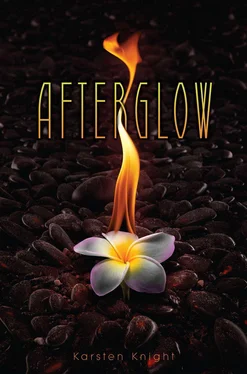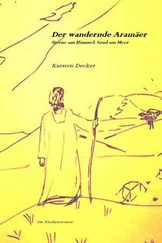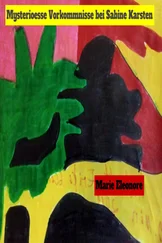Those men had learned better than to sit next to Johanna.
After all, she was Joaquin’s girl.
The bartender continued to polish a glass in front of her, eyeing her, but she kept her gaze on the old, broken holo-screen, which flickered with age. The three-dimensional image showed a torn-up field and a gaggle of rugby players wrestling for a ball. Johanna had no idea of the rules of the game, but the barkeep had confused her Polynesian roots for New Zealander and become convinced that she was originally from the island, even after she had assured him that she had grown up in Toronto, and she was on shore just for the night, before the crew left port tomorrow.
She felt the stranger looming behind her before he even had a chance to say anything. His shadow spilled over her like an oil slick, blocking the light from the dingy electric lantern overhead.
Johanna didn’t even give him a chance to draw first blood. “Oh, come on,” she said, over her shoulder, without even looking at him. “You should know that you’re supposed to think of the pickup line, then walk over. Not the other way around. What is this, amateur hour?”
Still, he said nothing, but from his shadow she could see that he was gesturing with his hands. “Are you listening to a word I’m saying?” she started to say, swiveling around on her barstool.
She stopped when she saw the stranger. He was a strikingly handsome man, with a dark, even tan, and hair cropped close to his skull. Either he came from a life of hard, manual labor, or he was just naturally built, because his forearms were like small logs. She could tell that his T-shirt concealed some hard, toned lines as well.
But it wasn’t the man’s beauty that stopped her mid-sentence. It was the fact that he was gesturing wildly with his hands, alternating between signs and then touching his throat.
The man was a mute.
“I am so sorry,” Johanna said. She clamped a mortified hand down over her forehead. “If I’d known you couldn’t speak . . .”
Then the stranger’s hands fell back to his sides, and a devious grin spread across his face. “There’s nothing wrong with my vocal cords. I just wanted to see you squirm.”
Johanna crossed her arms. “Wow, this must be a new record for me,” she said. “You’ve only put two sentences together, and I already hate your guts.”
The stranger nodded back toward the door. “Want me to give it a second try? I’m sure if I worked really hard, I could have made you hate me in one sentence.”
“Great. Think of one and come back tomorrow. I’ll be here.” Johanna spun back to face the counter.
The stranger slid onto the barstool next to her. “Here’s the thing. I fully acknowledge that I’ve blown whatever remote chances with you I thought I had, before I awkwardly approached you from behind and inconveniently found myself speechless. I assume, from the calluses on your hands and from the surly coworkers of yours who have invaded this bar, that you probably work on the boat that pulled into port this morning, and that romancing you is futile when you’ll just set sail again tomorrow. Your general standoffishness tells me that you’re either not looking for romance or you’ve got a boyfriend, and the fact that a room full of horny, sex-starved sailors are keeping their distance from you like you’re radioactive suggests that it’s probably the latter. So,” he said, and propped up his head on his beefy fist, peering at her profile. “Think of this like a trade: I buy you a drink, in return for you enduring a conversation with me so I can save face. Everybody wins.”
Johanna finally gave him the courtesy of eye contact. “That doesn’t buy you much time. I drink very fast.”
“Fortunately, I talk very fast.” The stranger held up two fingers to the bartender, already assuming she’d agreed to his terms.
Johanna pushed away her empty bottle and accepted the fresh beer from the bartender. “You know, some say persistence is a virtue. I say that persistence can get you killed.”
“You’d be surprised what I’m impervious to,” the stranger replied. He took a sip of his beer to cover a smile.
When he turned back to her, he could see something in her eyes as she peered at him. She’d shucked the whole standoffish act, replaced it with curiosity . . . and if he wasn’t mistaken, the first symptoms of déjà vu. “What’s your name, stranger?” she asked.
“Colton Halliday,” he said, and held out his bottle to toast her. “Call me Colt, though.”
“Colt?” She giggled in a way that was disproportionately feminine for a roughneck deckhand. “Are you a man or a horse?”
This time it was his turn to itch with déjà vu. “Some would say neither,” he said.
She rubbed her eyes wearily. “I’m sorry, I . . . I was just overcome with this weird sensation. Have we met before?” She studied him, taking in the hard lines of his cheekbones, the disconcerting flawlessness of his skin. He was beautiful to be sure, but there was something surreal to the perfection. He was like one of those computer-generated people she’d seen in old films, where they were so immaculately animated that they looked too real to be real.
There was a flash of concern on his face, and he shrank back in his seat under the scrutiny of her gaze. “I assure you,” he said finally, “that if we had met before, there is no way I could have forgotten you.”
This visibly relaxed Johanna, who loosened up a bit with a mocking smile. “And I guess there’s no way I could have forgotten your over-the-top, pitiable charm.”
But despite their rough start, she played right into his hands: She indulged him in conversation, a real conversation, while they both nursed their beers. She talked about growing up in Canada, adopted as a newborn from a Micronesian orphanage, and about tracking down her long-lost sister twenty years later, who she had been separated from when she was too young to remember. Colt told her about his own life, also as an orphan—raised through foster care in the American southwest before he was emancipated at age sixteen. Taking on what odd jobs he could find, enough to pay his way as he traveled the world. He talked about certain elements of his life in great detail, and shrouded others in vague statements.
Colt noticed how Johanna wasn’t racing to finish her beer. And if he had any doubts that she was enjoying his company, they were erased the moment she signaled for the bartender to bring them two more.
Tell me now , he thought with a mental smirk, that persistence doesn’t pay off.
His entire existence, his mission in life—for the last five hundred years—had hinged upon unflagging persistence.
And it was about to pay off.
He could see her eyes growing cloudier the more she drank. She was laughing more frequently, relaxing her posture, even touching his knee once or twice during their conversation. She didn’t even look disapproving when his eyes took the liberty of roaming her body once or twice.
Little did she realize he knew every inch of her body very well.
Eventually, while she was in the middle of a story about a bar fight in a Taiwanese port, Colt interrupted her: “Hey, do you want to get some fresh air? Step outside and go for a walk?” She raised an eyebrow at him, so he continued innocently, “You only get to spend so much time on land, it seems a shame to spend most of it cooped up inside a dingy bar.”
Johanna’s eyes flicked to the other sailors, perhaps weighing the consequences of following Colt outside. But then she chugged the remainder of her beer, set it down hard on the bar, and took Colt by the hand. He led her through the front door, and as the eyes of the other sailors followed her with surprise and warning, she offered them a wan smile back that said, I’ve got this under control.
Читать дальше












